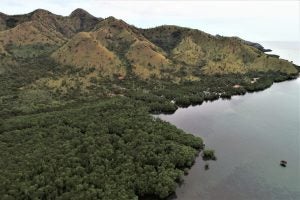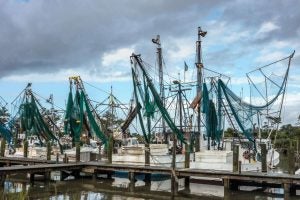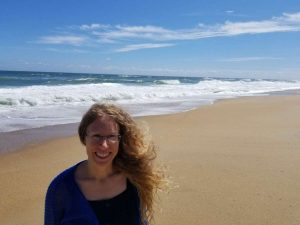Faculty Highlight: Dr. Nadine Heck
How does one choose a career when interested in so many different things? That is a question that Dr. Nadine Heck, Assistant Professor in the Department of Coastal Studies, once had to answer. Dr. Heck grew up in Germany on Lake Constance – an inland “ocean” bordered by three countries at the foot of the Alps. She spent a lot of her childhood traveling to different parts of the world, learning about different natural environments and social cultures. Based on these experiences, Dr. Heck found that her interests straddled both social sciences and natural sciences, which led her to study human-environment geography, a mix of physical and human geography.
 During her upbringing, Dr. Heck often wondered how people around the world could manage and conserve natural environments, in particular oceans. No single entity owns an ocean, so how could these shared spaces be protected and these protective measures be enforced? These questions lead her to pursue a Ph.D., investigating the management effectiveness of marine protected areas (MPA)- areas set aside with long-term conservation goals in mind in British Columbia.
During her upbringing, Dr. Heck often wondered how people around the world could manage and conserve natural environments, in particular oceans. No single entity owns an ocean, so how could these shared spaces be protected and these protective measures be enforced? These questions lead her to pursue a Ph.D., investigating the management effectiveness of marine protected areas (MPA)- areas set aside with long-term conservation goals in mind in British Columbia.
“I liked that [MPAs] pose complex management issues related to multiple sectors including fisheries, tourism, protection, and aquaculture. They are really diverse spaces where multiple aspects intersect,” says Heck.
After completing her Ph.D. and spending a few years as a postdoc at Cornell University and the University of California Santa Cruz, Dr. Heck took her current position in the Department of Coastal Studies. She is based at the Coastal Studies Institute on the ECU Outer Banks Campus and is expanding her research on marine conservation and fisheries in multiple projects, including several collaborative ones. In fact, Heck was drawn to ECU due to the interdisciplinary nature of the department which allowed her to combine her interests in human-environment interactions. The potential for collaboration among her new colleagues, just down the hall, was a major factor that drew her to ECU. “It’s a great work setting for creating new ideas.”, she says.

Mangrove forests provide many benefits. They provide habitat for many species, can mitigate impacts from natural disasters, and have the ability to sequester carbon from the atmosphere.
Dr. Heck is currently working on three projects with colleagues in the department, two of which include studying the protection of mangroves on a global scale with both Dr. David Lagomasino and Dr. Siddharth Narayan. One project explores how effective existing protected areas are for preserving mangroves and to what extent management and governance arrangements are influencing conservation outcomes in these areas. The second project studies to what extent mangroves that provide critical flood risk benefits to people are protected and where future conservation priorities could be placed to maintain this important ecosystem service.
The third collaborative project is a study on fisheries and environmental change with Dr. Jim Morley. Heck and Morley, with the help of their lab members, are working to understand the impacts of climate change on North Carolina shrimp fisheries. By combining fisher’s knowledge about shrimp with environmental models, the group is assessing how environmental impacts affect brown and white shrimp recruitment, abundance, and transition across life stages. Once the data analysis phase is complete, their findings and available models will be used to create a forecasting tool for the NC shrimp fishery that integrates local knowledge with environmental data.

Members of Dr. Heck’s Marine Social-Ecological Systems Lab are speaking with shrimp fishers to gather information about the changes they are noticing while out on the water.
In addition to collaborating with others within the Department of Coastal Studies, Dr. Heck has built many connections with colleagues around the world. She is leading an NSF-funded case study on fisheries in Hawaii that is part of a larger project funded by the Belmont Forum looking at Negotiating Ocean Conflicts among Rivals for Sustainable and Equitable Solutions (NOCRISES).
Dr. Heck has also been working on a global project to assess climate risk to fisheries, funded by the German Government, with colleagues at the University of California Santa Cruz and The Nature Conservancy. The project developed indicators to assess global risks to coastal fisheries in coastal nations due to storms and long-term climate-driven changes. Dr. Heck recently led a paper from this project that assessed the first global set of indicators to assess coastal nations’ risks to storm impacts on fisheries. The paper, published in the journal Marine Policy, shows that the most at-risk countries are small island nations that are highly exposed to storms and rely heavily on fisheries for income, employment, and food security. In addition to identifying the most at-risk areas, this work provides insights for developing adaptive strategies in the face of climate change, particularly large storm events.

Dr. Heck enjoys walking on the beach along the ocean, even when it’s stirred by offshore storm Hurricane Larry.
While Dr. Heck thoroughly enjoys the many aspects of her job, it does not come without challenges. “Getting others to understand the diversity of social science can be very difficult. Along the same lines, having to place applied research into a theoretical context for funding is also challenging.”
Dr. Heck feels that her hobbies truly intersect with her work, stating, “The beautiful landscapes around the world are amazing to me so I want to be able to protect them while also encouraging people to use them and enjoy them in a sustainable way.” And when the going gets tough, at least she has the opportunity to take a breather, or even perhaps inspire her next project. The Outer Banks, through its many beaches, nature trails, and parks, provides ample opportunities to enjoy her favorite things- wild landscapes, water, and hiking.